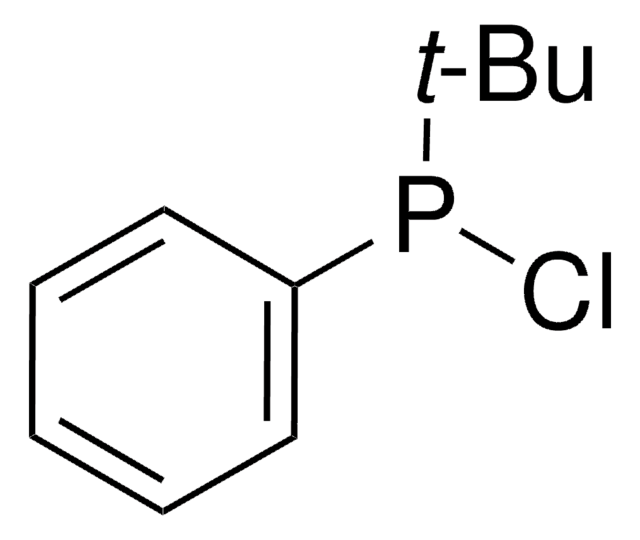301558
Di-tert-butylchlorophosphine
96%
Synonym(s):
P, P-bis(1 1-dimethylethyl), Phosphinous chloride
About This Item
Recommended Products
Assay
96%
form
liquid
reaction suitability
reagent type: ligand
reaction type: Suzuki-Miyaura Coupling
refractive index
n20/D 1.482 (lit.)
bp
48 °C/3 mmHg (lit.)
density
0.951 g/mL at 25 °C (lit.)
functional group
phosphine
SMILES string
CC(C)(C)P(Cl)C(C)(C)C
InChI
1S/C8H18ClP/c1-7(2,3)10(9)8(4,5)6/h1-6H3
InChI key
MCRSZLVSRGTMIH-UHFFFAOYSA-N
General description
Application
- The Pd-catalyzed amination reaction with aryl halides.
- The Pd-catalyzed Suzuki-Miyaura cross-coupling of arylboronic acids with aryl bromides and chlorides.
Signal Word
Danger
Hazard Statements
Precautionary Statements
Hazard Classifications
Skin Corr. 1B
Storage Class Code
8A - Combustible corrosive hazardous materials
WGK
WGK 3
Flash Point(F)
143.6 °F - closed cup
Flash Point(C)
62 °C - closed cup
Personal Protective Equipment
Certificates of Analysis (COA)
Search for Certificates of Analysis (COA) by entering the products Lot/Batch Number. Lot and Batch Numbers can be found on a product’s label following the words ‘Lot’ or ‘Batch’.
Already Own This Product?
Find documentation for the products that you have recently purchased in the Document Library.
Customers Also Viewed
Our team of scientists has experience in all areas of research including Life Science, Material Science, Chemical Synthesis, Chromatography, Analytical and many others.
Contact Technical Service











